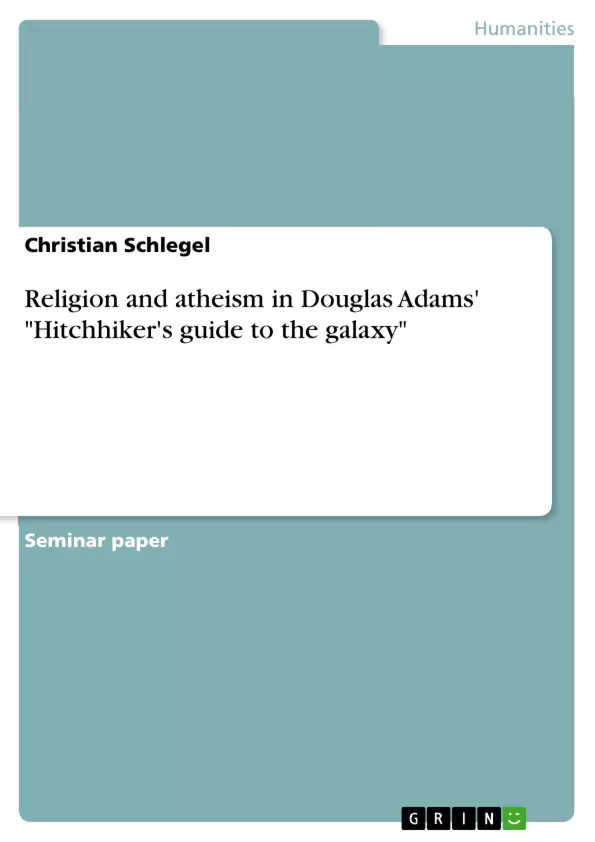Douglas Adams says about himself that he is not just a confessing atheist, but rather a radical atheist. This attitude leads us to the task of this seminar paper. It will examine some of the theological and philosophical elements, which appear in the text, and how the author’s personal confession influenced their use. Furthermore, as a result, we will see in how far this piece of literature can be regarded as serious criticism of religion.
Inhaltsverzeichnis (Table of Contents)
- I Introduction
- 1. General Introduction
- 2. About the Author
- II Sideswipes on Religion
- 1. Two Thousand Years after One Man Had Been Nailed to a Tree
- 2. The Bible and other Best-selling Books
- 3. A Proof for the Non-Existence of God
- III Evolution or Creation?
- 1. Remarks on Evolution
- 2. Mankind: The Masterpiece of the Creation
- IV The Quest for Meaning
- 1. Deus Ex Machina
- 2. "Life, the universe and everything" = 42
- V Conclusion
Zielsetzung und Themenschwerpunkte (Objectives and Key Themes)
This seminar paper examines the theological and philosophical elements present in Douglas Adams' "Hitchhiker's Guide to the Galaxy" and explores how the author's personal beliefs influenced their use. It delves into the extent to which this work can be considered a serious critique of religion.
- The impact of Douglas Adams' atheism on his writing.
- The use of theological and philosophical concepts in the context of the story.
- The satirical critique of religious beliefs and ideas.
- The role of evolution in Adams' worldview and its influence on the narrative.
- The search for meaning and purpose within a seemingly absurd universe.
Zusammenfassung der Kapitel (Chapter Summaries)
The introduction provides an overview of Douglas Adams' background and his transition from a committed Christian to an agnostic and later to an atheist. It highlights his fascination with religion and how this influenced his writing. The chapter titled "Sideswipes on Religion" explores Adams' satirical approach to religious themes. It examines how he uses humor to critique religious beliefs and ideas. The chapter "Evolution or Creation?" focuses on Adams' embrace of evolutionary theory as a scientific explanation for the origin of life and contrasts it with religious creation narratives. The chapter "The Quest for Meaning" delves into the themes of meaning and purpose within the context of the story, exploring how Adams uses the concept of "life, the universe, and everything" to question the search for absolute answers.
Schlüsselwörter (Keywords)
Douglas Adams, Hitchhiker's Guide to the Galaxy, atheism, religion, satire, evolution, creation, meaning, purpose, absurdism, humor, philosophy, theology.
- Citation du texte
- Christian Schlegel (Auteur), 2003, Religion and atheism in Douglas Adams' "Hitchhiker's guide to the galaxy", Munich, GRIN Verlag, https://www.grin.com/document/78184



